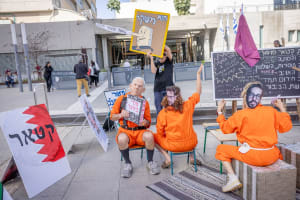Israeli energy minister predicts shared Iranian threat will facilitate Saudi normalization deal
'It’s important to emphasize to the world, we are not [just] fighting Hamas,' Cohen tells Jerusalem Post

Israeli Energy Minister Eli Cohen, who recently served as foreign minister, says that having a common enemy will eventually convince Saudi Arabia to sign a normalization deal with Israel.
“It’s important to emphasize to the world, we are not [just] fighting Hamas,” Cohen told The Jerusalem Post, referring to the ongoing fight with Iranian-backed regional terror proxies such as Hezbollah, the Houthis in Yemen and Shiite militias in Syria and Iraq.
“So actually we are fighting Iran at the end of the day. We are fighting the war of the free world. We are fighting against Iranian aggression,” the Israeli minister stated.
Assessing the increasingly volatile situation on the Lebanese border, Cohen emphasized that a potential full-scale war with Hezbollah means “it will be a war with Iran. When you are fighting Hezbollah, you are actually fighting Iran.”
In practice, Israel and Iran are already locked in an increasingly escalating military confrontation across several fronts, due to the ayatollah regime’s ambitions to encircle the Jewish state with Hamas in the south and Hezbollah in the north.
Five senior commanders in the Iranian elite Islamic Revolutionary Guard Corps (IRGC) were recently assassinated in Syria, in a military operation that was attributed to Israel.
Iranian President Ebrahim Raisi threatened that Tehran would respond.
“The Islamic Republic will not leave the Zionist regime’s crimes unanswered,” Raisi warned.
The Israeli energy minister stressed during his interview that Hezbollah is pushing Lebanon, against its will, towards a military confrontation with Israel.
“I receive [third-party] messages from the government in Lebanon, not direct messages, but through my colleagues and counterparts in other countries [in which the Lebanese are saying], ‘We don’t want to have a war with Israel.’"
“We say: ‘We don’t want to have a war either, but restrain Hezbollah,’” Cohen revealed.
The senior Israeli official added that Hezbollah takes orders from Tehran and not Beirut, which only increases the value of a militarily powerful Israel, in the eyes of the concerned Saudis.
“They say, ‘We don’t control Hezbollah’ and ‘Hezbollah receives instructions not from Beirut but from Tehran.’ “Iranian aggression, and the fact that [Iran] is the No. 1 funder of terror groups, increases the importance Saudi Arabia places on a deal with Israel,” said Cohen.
Official diplomatic ties between Israel and moderate Arab states have deteriorated in recent months, due to Israel's military operations against the Hamas terror group, which initiated the ongoing war in Gaza when it invaded and massacred more than 1,200 Israeli men, women and children, on October 7.
However, some believe moderate Arab rulers privately fear Hamas and other Iranian-backed terror groups, and that countries like Saudi Arabia, Egypt, Bahrain and the UAE, also see Hamas as a threat to the region, and believe that removing Hamas is a first step to dismantling the current Iranian-led multi-front threat to many Middle Eastern governments.
The U.S. Biden administration recently tried to link a Saudi-Israeli normalization deal to the establishment of a Palestinian state. However, Israel’s trust in the Palestinian Authority remains low and many Israelis fear that a two-state solution could potentially transform the West Bank into an even larger terror threat than Gaza.
While Saudi Arabia officially backs the two-state solution, Cohen believes that the Saudis are mainly interested in the deal in order to clinch American security guarantees.
“The central reason that Saudi Arabia wants to make a deal with Israel is to receive a security umbrella from the United States against Iran and [its proxy] terror groups,” Cohen stated.

The All Israel News Staff is a team of journalists in Israel.













